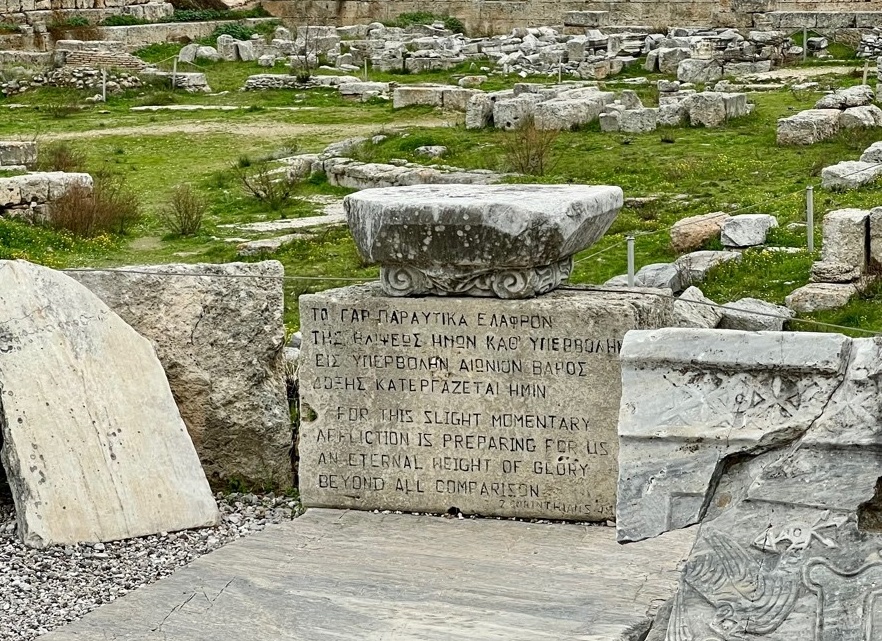Table of Contents
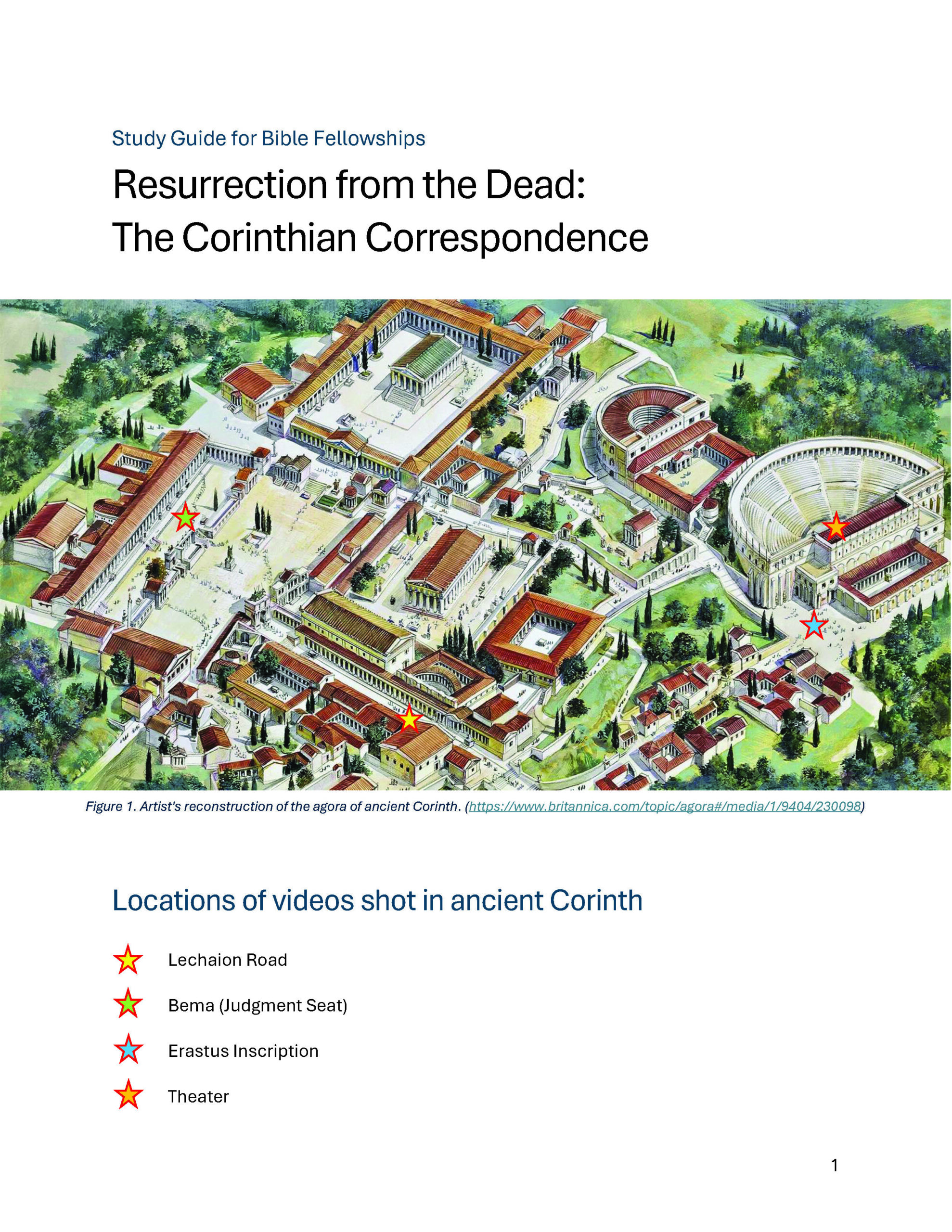
Download the Study Guide
We encourage you to download this guide, which provides additional detail and context, plus reflection questions, to this sermon. (It was originally provided for GraceLife’s Bible Fellowship groups, which meet following the sermon each week.)
Paul in Corinth
I hope you enjoyed our journey in the footsteps of the apostle Paul as he traversed the city of Athens (you can watch that sermon here if you missed it). Paul’s time there is recorded for us in Acts 17. Acts 18 tells us where he went next: “After these things he left Athens and went to Corinth” (v. 1).
In this recorded sermon, I preach where Paul once stood—in Ancient Corinth.
Paul had it fairly easy in Corinth (as “easy” as things ever got for Paul—though one might argue he still had the ever troublesome Corinthians themselves to contend with, and we’ll see how Paul had a minor skirmish with the local authorities in Corinth). But in Corinth, Paul found friends and faithful fellow workers. Here’s how the Scriptures characterize Paul’s stay in Corinth:
And he found a Jew named Aquila, a native of Pontus, having recently come from Italy with his wife Priscilla, because Claudius had commanded all the Jews to leave Rome. He came to them, and because he was of the same trade, he stayed with them and they were working, for by trade they were tent-makers. And he was reasoning in the synagogue every Sabbath and trying to persuade Jews and Greeks.
But when Silas and Timothy came down from Macedonia, Paul began devoting himself completely to the word, solemnly testifying to the Jews that Jesus was the Christ. But when they resisted and blasphemed, he shook out his garments and said to them, “Your blood be on your own heads! I am clean. From now on I will go to the Gentiles.” Then he left there and went to the house of a man named Titius Justus, a worshiper of God, whose house was next to the synagogue. Crispus, the leader of the synagogue, believed in the Lord with all his household, and many of the Corinthians when they heard were believing and being baptized. And the Lord said to Paul in the night by a vision, “Do not be afraid any longer, but go on speaking and do not be silent; for I am with you, and no man will attack you in order to harm you, for I have many people in this city.” And he settled there a year and six months, teaching the word of God among them. (Acts 18:2–11)
Of course, as was often the case, it didn’t take long for the Jews of the region to travel to where Paul was and begin to cause trouble—specifically, to silence the apostle. Acts tells us:
But while Gallio was proconsul of Achaia, the Jews with one accord rose up against Paul and brought him before the judgment seat, saying, “This man persuades men to worship God contrary to the law.” (Acts 18:12–13)
It’s incredible: Here in Corinth, that judgment seat, the Bema, to which they brought Paul still exists. Below is a photo of it (I’m standing at it in the video).
The judgment seat in Corinth is the very place where Paul was put on trial—or, rather, almost stood trial, before Gallio essentially dismissed all charges.
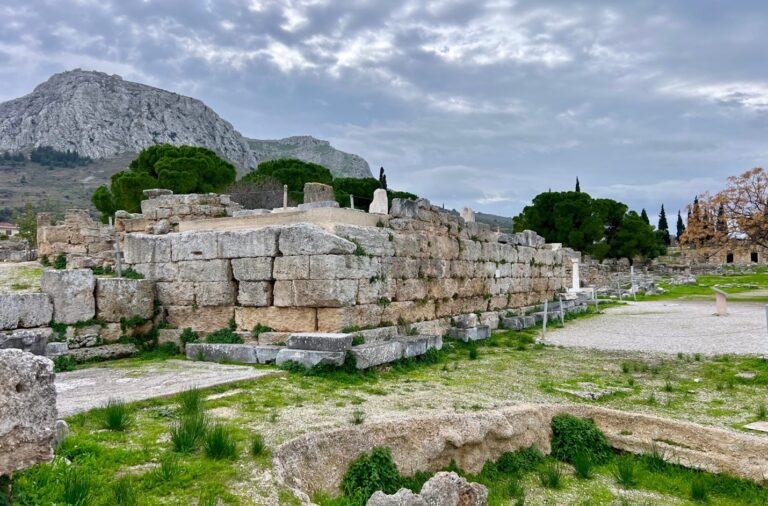
Gallio and the Erastus Inscription
Gallio was the leader in the area who presided over this trial of Paul. He’s the same Gallio who was the brother of the Roman stoic philosopher and dramatist Seneca. That Gallio presided over this trial is significant, because it places Paul in Corinth in approximately AD 51.
Let’s read the full encounter of what happened at the very site shown above, as recorded in Acts:
But while Gallio was proconsul of Achaia, the Jews with one accord rose up against Paul and brought him before the judgment seat, saying, “This man persuades men to worship God contrary to the law.” But when Paul was about to open his mouth, Gallio said to the Jews, “If it were a matter of wrong or of vicious crime, O Jews, it would be reasonable for me to put up with you; but if there are questions about words and names and your own law, look after it yourselves; I am unwilling to be a judge of these matters.” And he drove them away from the judgment seat. And they all took hold of Sosthenes, the leader of the synagogue, and began beating him in front of the judgment seat. But Gallio was not concerned about any of these things. (Acts 18:12–17)
Although Gallio’s indifference to Paul could not be counted as friendship, Paul did make friends with some city officials in Corinth. In the book of Romans (which Paul wrote while in Corinth), he mentions a man named Erastus, whom he identifies as a city official (16:23).1An “Erastus” is also mentioned in Acts 19:22 and 2 Timothy 4:20. Scholars debate whether this is the same man or not. In Corinth, we see an inscription dedicated to a man named Erastus, who was a city official. The inscription speaks of Erastus having paved this road at his own expense in return for having gained the position.
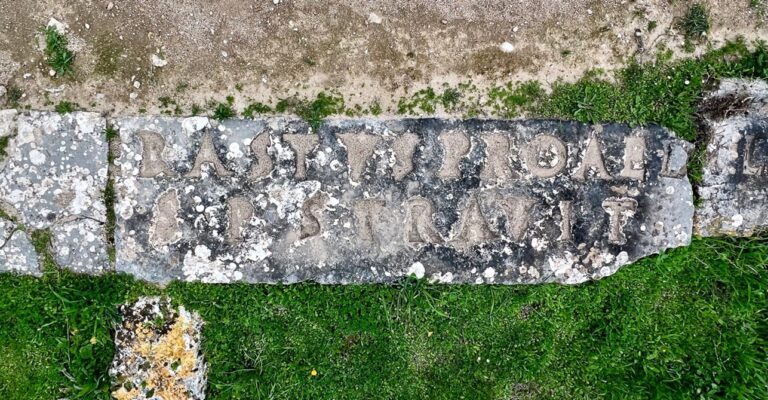
Preaching in Corinth: A Personal Note
Crafting sermons on resurrection from the dead (as I have since mid-October—see introductory sermon here) without diving deeply into the content of Corinthians has been difficult. I’ve alluded to 1 Corinthians 15 multiple times and exegeted some of its verses, but not nearly to the extent that I could have. With even the chance of this trip happening,2For those unaware, my family and I adopted twins from Hungary, and we traveled to them in January, with instructions to make some stop elsewhere in Europe first—hence our stops in Athens, Greece, and then Ancient Corinth. I held off on some of that material, hoping for the chance to preach at Corinth.
Being in Corinth has been a privilege and also a little nerve-wracking. Talking in front of the Bema, the judgment seat, I was a little nervous because there were some officials around these ancient sites who may not have been too excited about us filming on location. But that uncomfortable feeling is no comparison to what the apostle Paul must have felt as he was in the ancient city and wondered how people would react to him speaking publicly about Jesus.
Resurrection from the Dead: Details from Paul
I didn’t count on having the ancient Theater of Corinth all to myself, but that’s exactly what I got upon arrival—and is where I gave this part of the message.
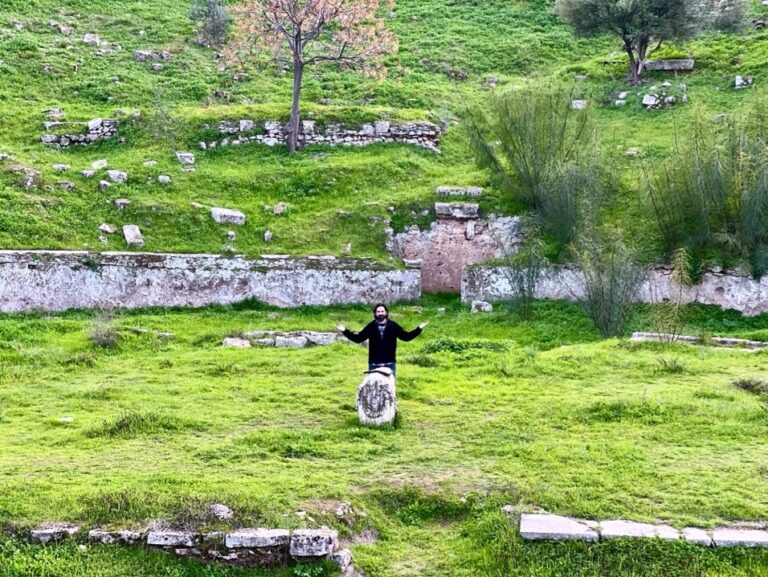
In the video of this sermon, I am speaking from the above theater as we look at the most detailed description of the resurrection body that is given in the Bible, in 1 Corinthians 15:
But someone will say, “How are the dead raised? And with what kind of body do they come?” You fool! That which you sow does not come to life unless it dies; and that which you sow, you do not sow the body which is to be, but a bare grain, perhaps of wheat or of something else. But God gives it a body just as He wished, and to each of the seeds a body of its own. All flesh is not the same flesh, but there is one flesh of men, and another flesh of beasts, and another flesh of birds, and another of fish. There are also heavenly bodies and earthly bodies, but the glory of the heavenly is one, and the glory of the earthly is another. There is one glory of the sun, and another glory of the moon, and another glory of the stars; for star differs from star in glory.
So also is the resurrection of the dead. It is sown a perishable body, it is raised an imperishable body; it is sown in dishonor, it is raised in glory; it is sown in weakness, it is raised in power; it is sown a natural body, it is raised a spiritual body. If there is a natural body, there is also a spiritual body. So also it is written, “The first man, Adam, became a living soul.” The last Adam became a life-giving spirit. However, the spiritual is not first, but the natural; then the spiritual. The first man is from the earth, earthy; the second man is from heaven. As is the earthy, so also are those who are earthy; and as is the heavenly, so also are those who are heavenly. Just as we have borne the image of the earthy, we will also bear the image of the heavenly.
Now I say this, brethren, that flesh and blood cannot inherit the kingdom of God; nor does the perishable inherit the imperishable. Behold, I tell you a mystery; we will not all sleep, but we will all be changed, in a moment, in the twinkling of an eye, at the last trumpet; for the trumpet will sound, and the dead will be raised imperishable, and we will be changed. For this perishable must put on the imperishable, and this mortal must put on immortality. But when this perishable will have put on the imperishable, and this mortal will have put on immortality, then will come about the saying that is written, “Death is swallowed up in victory. O death, where is your victory? O death, where is your sting?” The sting of death is sin, and the power of sin is the law; but thanks be to God, who gives us the victory through our Lord Jesus Christ.
Therefore, my beloved brethren, be steadfast, immovable, always abounding in the work of the Lord, knowing that your toil is not in vain in the Lord. (1 Corinthians 15:35–58)
What Kind of Body? (1 Corinthians 15:35–49)
Verse 35–36: Judging from Paul’s reaction, the question (about what our resurrection bodies will be like) has not been raised for the same purposes we are raising the same question. Rather, the question is raised in the manner of the Sadducees who hoped to prove resurrection impossible through their “clever” reasoning. The questioner is implying that resurrection is unlikely regarding what we know about the body (i.e., our earthly bodies) and what happens to it after death
Verses 37–41: Paul is saying that the question is foolish, that his audience should use their imaginations. Our bodies will be different at the resurrection just as there are different sorts of bodies that occur now on earth. It’s a wonderful illustration of the continuity and discontinuity that I’ve preached about before regarding resurrection from the dead.3See December 15, 2024, sermon, “Resurrection Life—What Is It Like? Continuity & Discontinuity.” Even now some scoff, saying, “Come on, our bodies are going to be in the ground and disintegrated; how can God do anything with that?” He then uses the seed as an example. In the same way that we have to die to live, an acorn has to die in order to become the mighty oak tree it’s meant to be. The entire tree is in that acorn, but it has to die and go into the ground to become something even more glorious and majestic. In the same way, our body has to die for it to become a resurrected body; that new body comes forth from the old (continuity), but is of a different sorts (discontinuity), i.e., a better one.
Verses 42–44: In these next few verses, Paul begins to contrast these important continuities and discontinuities. Following is a comparison of the body that dies (the earthly body) and the body in its resurrected state:

Note that, in the fourth contrast (natural vs. spiritual), the distinction is not between a fleshly and spiritual body or between a material and immaterial body; rather, it’s about the power, the nature, of the thing—the spiritual body being heavenly, from above, and holy.
Verses 45–46: In these verses, Paul is talking about the order of events, the order in which we’ll have these bodies. He’s also talking about the order in which Adam and Jesus appeared.
Verses 46–49: Here, along with other verses in Scripture, we find that we’re justified in saying that our spiritual (resurrection) bodies will be very much like the one of the glorified Lord Jesus.
Mysteries Revealed (1 Corinthians 15:50–58)
“Behold, I tell you a mystery; we will not all sleep …” (1 Corinthians 15:51)
Verse 50: This verse isn’t saying that the resurrection body in the future won’t be physical, but that this earthly body, our current “flesh and blood,” as Paul puts it, “cannot inherit” the next life without change.
Verse 51: Here, Paul tells us a mystery: “We will not all sleep.” The word “sleep” in this verse is a euphemism for “death.” He’s saying that not everyone will experience death, “but we will all be changed”—that is, all believers will receive a resurrection body. Of course, elsewhere in Scripture, we’re told it’s appointed for men to die once, but there will be a generation that is alive when Jesus comes back, and they will not die. Those believers in Christ will simply be transformed, changed.
Verse 52: This change that will occur to believers who are alive at the return of Christ will happen “in a moment, in the twinkling of an eye”—it’s instantaneous change. Don’t miss the order of change: first, those who have died will be raised, and second, those still alive when Jesus comes back will be changed in an instant. Notice Paul’s use of the word “we,” referencing himself and his audience—i.e., those who were currently alive. He had an assumption that he would be alive when Jesus returned.
First, those who have died will be raised, and second, those still alive when Jesus comes back will be changed in an instant.
Verses 54–56: We say/hear the phrase mentioned in verse 55 a lot (“O death, where is your victory? O death, where is your sting?”). This isn’t a victory we’ve seen yet; it’s okay to claim it will be won, but only at the resurrection—only then—can it be said, “Death is swallowed up in victory.” Paul writes that “the sting of death is sin, and the power of sin is the law,” and what he’s saying is that sin produces death, and the law produces sin. Another way of summarizing these verses:
- The sting which produces death is sin.
- The power which produces sin is the law.
Verse 57: Christ was victorious over death in that He died and rose again; He was victorious over sin in that He completed the law. And how appropriate for Paul to speak of Christ as victor, especially in a city like Corinth. Corinth was the host/site of the Isthmian games, which Paul would have witnessed in the city. Christ is the victor—Christ is the One who is victorious in life.
It’s no wonder that Paul, writing from Corinth, writes of the pursuit of the Christian life as one competing, as an athlete. Paul writes:
I do all things for the sake of the gospel, so that I may become a fellow partaker of it. Do you not know that those who run in a race all run, but only one receives the prize? Run in such a way that you may win. Everyone who competes in the games exercises self-control in all things. They then do it to receive a perishable wreath, but we an imperishable. Therefore I run in such a way, as not without aim; I box in such a way, as not beating the air; but I discipline my body and make it my slave, so that, after I have preached to others, I myself will not be disqualified. (1 Corinthians 9:23–27)
Verse 58: This final verse of 1 Corinthians 15 is an appropriate conclusion to Paul’s discussion of the resurrection from the dead. The resurrection from the dead is a future event, but it has meaning for us now. We are to live well in the present, to be “steadfast, immovable, always abounding in the work of the Lord,” as Paul says.
How to Live (2 Corinthians 4:16–5:10)
In 1 Corinthians, Paul was teaching about the resurrection and offering correctives. But by the time he pens 2 Corinthians, the church at Corinth knows this doctrine. The language is no longer “I want you to know” or “I make known to you” (1 Corinthians 15:1) but, rather, “we know …”
And what we know is that the resurrection means we know how to live—it governs how we act. Here are the words of Paul in 2 Corinthians 4:16–5:9:
Therefore we do not lose heart, but though our outer man is decaying, yet our inner man is being renewed day by day. For momentary, light affliction is producing for us an eternal weight of glory far beyond all comparison, while we look not at the things which are seen, but at the things which are not seen; for the things which are seen are temporal, but the things which are not seen are eternal.
For we know that if the earthly tent which is our house is torn down, we have a building from God, a house not made with hands, eternal in the heavens. For indeed in this house we groan, longing to be clothed with our dwelling from heaven, inasmuch as we, having put it on, will not be found naked. For indeed while we are in this tent, we groan, being burdened, because we do not want to be unclothed but to be clothed, so that what is mortal will be swallowed up by life. Now He who prepared us for this very purpose is God, who gave to us the Spirit as a pledge.
Therefore, being always of good courage, and knowing that while we are at home in the body we are absent from the Lord—for we walk by faith, not by sight—we are of good courage, I say, and prefer rather to be absent from the body and to be at home with the Lord. Therefore we also have as our ambition, whether at home or absent, to be pleasing to Him.
And how fitting that Paul closes this passage with a verse about a place that he would have been quite familiar with in Corinth—the judgment seat:
For we must all appear before the judgment seat of Christ, so that each one may be recompensed for his deeds in the body, according to what he has done, whether good or bad. (2 Corinthians 5:10)
The judge at this judgment seat is Christ, and He rules in our favor, not out of indifference like Gallio, but out of love for us. He is a righteous judge who has declared us not guilty—and He has declared us righteous, just like Himself.
Jesus rules in our favor, not out of indifference like Gallio, but out of love for us. He is a righteous judge.
Don’t miss out on the detail in this verse that links the last two elementary principles of the oracles of God that we’ve been studying: the resurrection from the dead and eternal judgment.4The first four elementary principles—based on Hebrews 5:12–6:2—were: (1) repentance from dead works, (2) faith toward God, (3) baptisms, and (4) laying on of hands.
The deeds we do in the body are inseparably linked to our eternity.
Comfort from Corinth (1 Thessalonians 4:13–18)
There is something about Corinth that caused Paul, under the leadership of the Spirit, to write frequently about the resurrection of the dead—whether it was while writing to Corinth or from Corinth. In fact, he penned the book of 1 Thessalonians from Corinth, writing of comfort found in knowing something about resurrection from the dead.
Remember, before he came to Corinth, Paul was in Athens; before that, he was in Berea, and before that, Thessalonica. Writing back to the Thessalonians, he says this about death and resurrection:
But we do not want you to be uninformed, brethren, about those who are asleep, so that you will not grieve as do the rest who have no hope. For if we believe that Jesus died and rose again, even so God will bring with Him those who have fallen asleep in Jesus. For this we say to you by the word of the Lord, that we who are alive and remain until the coming of the Lord, will not precede those who have fallen asleep. For the Lord Himself will descend from heaven with a shout, with the voice of the archangel and with the trumpet of God, and the dead in Christ will rise first. Then we who are alive and remain will be caught up together with them in the clouds to meet the Lord in the air, and so we shall always be with the Lord. Therefore comfort one another with these words. (1 Thessalonians 4:13–18)
Consider how these words given comfort from Corinth:
- There is comfort that our grief (over death) is legitimized. The Bible doesn’t say “don’t grieve,” but that …
- There is comfort that our grief is not hopeless. We don’t grieve as those who have no hope because …
- This comfort is based on God’s care for us in Jesus. Our hope is in Him and in what He has done for us.
- There is comfort that our loved ones are not lost or left behind. They didn’t miss out on the resurrection (as some in Paul’s time thought they would) because they died earlier. In fact, the dead will rise (Why? There’s an old joke that they’ve got six feet farther to go.)
- There is also comfort in this new revelation that we who are waiting, then we will be changed.
- Finally, there is comfort that whatever our lot in life, we will live together with the Lord.
Life in the Lamb
My time in Greece has been spent in awe of walking what might have been the same road walked by the apostle Paul. The truth is that, one day, I will walk the same roads as Paul. Not streets paved of stone by Paul’s friend Erastus (the city official), but streets of gold made by God.
In that place, that heavenly city, there will be no temple—no Temple to Apollo, no Temple to Aphrodite, no human-made temple of any kind, like the multiple ones in Greece, because, according to Scripture, “the Lord God the Almighty and the Lamb are its temple” (Revelation 21:22). Those are the words of the apostle John, who also wrote these words in the final book of the Bible:
And the twelve gates were twelve pearls; each one of the gates was a single pearl. And the street of the city was pure gold, like transparent glass. … And the city has no need of the sun or of the moon to shine on it, for the glory of God has illumined it, and its lamp is the Lamb. The nations will walk by its light, and the kings of the earth will bring their glory into it. In the daytime (for there will be no night there) its gates will never be closed; and they will bring the glory and the honor of the nations into it; and nothing unclean, and no one who practices abomination and lying, shall ever come into it, but only those whose names are written in the Lamb’s book of life. (Revelation 21:21, 23–27)
Christ Jesus is that Lamb: the Lamb slain, but now risen. He is our reason to live, our reason to celebrate.
As Paul put it in his first letter to the Corinthains, “Christ our Passover … has been sacrificed. Therefore let us celebrate the feast, not with old leaven, nor with the leaven of malice and wickedness, but with the unleavened bread of sincerity and truth” (1 Corinthians 5:7–8).
We will indeed celebrate—with sincerity and truth—in the resurrection of the dead.
